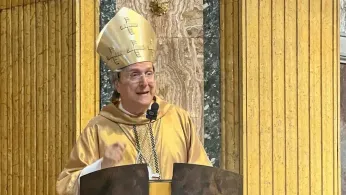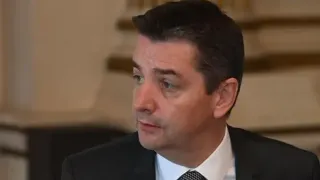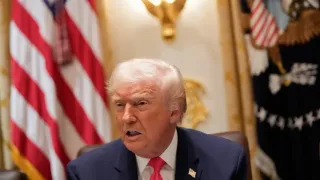
Nov 8
Italian Bishop Breaks Catholic Silence: “Denying LGBTQ+ People the Right to Love Is Simply Wrong”
READ TIME: 4 MIN.
It was an ordinary autumn in Rome—if you can call a city of saints, sinners, and scooter traffic ever ordinary—when Bishop Francesco Savino did something extraordinary: he stepped up to a microphone, looked the Catholic world in the eye, and called out its centuries-old silence. “People in same-sex relationships should not be denied the opportunity to be loved and to love, even on an intimate, sexual level, because denying them this, denying them their right, I repeat, is simply wrong,” Savino told DirittoDiCronaca.it, his words echoing from southern Italy all the way to the Vatican’s marbled halls .
For LGBTQ+ Catholics who have spent lifetimes hearing their love described as “intrinsically disordered”—or worse—these words hit like a thunderclap. Suddenly, a bishop, a vice president of the Italian Bishops’ Conference no less, was not just welcoming queer people to church but affirming their right to love, sex, and dignity. Not in whispers, not with caveats, but out loud, in print, and from the pulpit.
If Savino’s interview was a spiritual mic drop, his actions were even bolder. In September, he presided over a Mass at the Church of the Gesù in Rome for more than a thousand LGBTQ+ Catholic pilgrims and their families, an event that shimmered with hope, rainbow flags, and the unmistakable hum of something shifting .
The congregation—some in T-shirts quoting “nell’amore non c’è timore” (“there is no fear in love”) from the First Letter of John, others waving rainbow fans—listened as Savino preached what could only be described as radical inclusion. “We are all a pilgrim people of hope and we want to leave this celebration more joyful and hopeful than ever,” he proclaimed, urging the faithful to believe in a God who loves each of us with “a unique and unrepeatable love—unconditional love” .
It wasn’t just a feel-good gesture. This was a Mass in the heart of Rome, presided over by a bishop with the Pope’s blessing, celebrated with a rainbow cross leading the procession. If there were ever a moment for LGBTQ+ Catholics to feel seen, it was here, with Savino at the altar and a congregation of thousands singing out that love—yes, even queer love—belongs in the heart of faith .
Make no mistake: Savino’s stance is not the official line. The Catholic Catechism, after all, still calls homosexual acts “intrinsically disordered” and requires those with same-sex attraction to live in chastity—no exceptions, no “but what if I’m in love?” . But Savino, whose activism has made him a beacon for progressive Catholics, is pushing the conversation where it’s never gone before: into the lived reality of LGBTQ+ people, demanding not just tolerance but dignity, recognition, and full participation.
The Italian bishop’s words arrive at a moment when the Italian Church itself is undergoing change. Just days before Savino’s interview, the Italian bishops’ synodal assembly approved a document encouraging support for civil LGBTQ+ events like Pride marches—a move that, while not yet doctrine, signals a significant thaw in church attitudes . This is about more than theology. It’s about the Church catching up to its queer faithful, many of whom have never stopped showing up—even when it meant sitting in pews filled with side-eye, silence, and shame.
The reaction in LGBTQ+ circles has been a cocktail of celebration, disbelief, and cautious optimism. “It feels like the first time in my life that someone in a mitre is saying what we’ve all been screaming for years: that our love is not a problem to be solved but a gift to be celebrated,” said one attendee at the Jubilee Mass, still clutching a rainbow fan as she left the Church of the Gesù .
Activists and theologians alike are hailing Savino’s move as a potential turning point, especially in a country where the Catholic Church still wields enormous cultural influence. Yet many are quick to point out that words—even brave, beautiful ones—are not enough. “We want sacraments. We want weddings. We want to baptize our children without having to hide our partners,” said a leader from Tenda di Gionata, the lay group that organized the Jubilee pilgrimage .
For LGBTQ+ people of faith, Savino’s statements are a lifeline—but also a challenge to the rest of the hierarchy. Will other bishops follow? Will the Vatican respond? Or will this be another hopeful moment that fades into footnotes and headlines?
Bishop Francesco Savino’s defiance isn’t just a story for church insiders. It’s a global signal that the conversation is shifting—not just in Rome, but in every parish, Pride march, and family dinner where faith and queerness meet. His words are already reverberating beyond Italy: LGBTQ+ Catholics in Brazil, the Philippines, and the U.S. are watching, hoping, and asking their own bishops, “If him, why not you?” .
For many, Savino is a living reminder that even the most tradition-bound institutions can be moved—not by pressure alone, but by the courage to name what’s right. In a world where queer people of faith are still too often forced to choose between their identity and their spirituality, his message is both balm and battle cry: “Restore dignity to everyone, especially to those who have been denied it” .
The revolution, it seems, is not just being televised—it’s being preached.
As candles flicker in churches from Calabria to California, queer Catholics and their allies are daring to hope: maybe love—real, messy, embodied, joyful love—has a place at the altar after all. And as Bishop Savino’s voice rings out, both in sacred spaces and the public square, it reminds us that the fight for LGBTQ+ dignity is holy work. “There is no fear in love,” says the T-shirt. Amen to that—and may more bishops have the courage to say it out loud.






